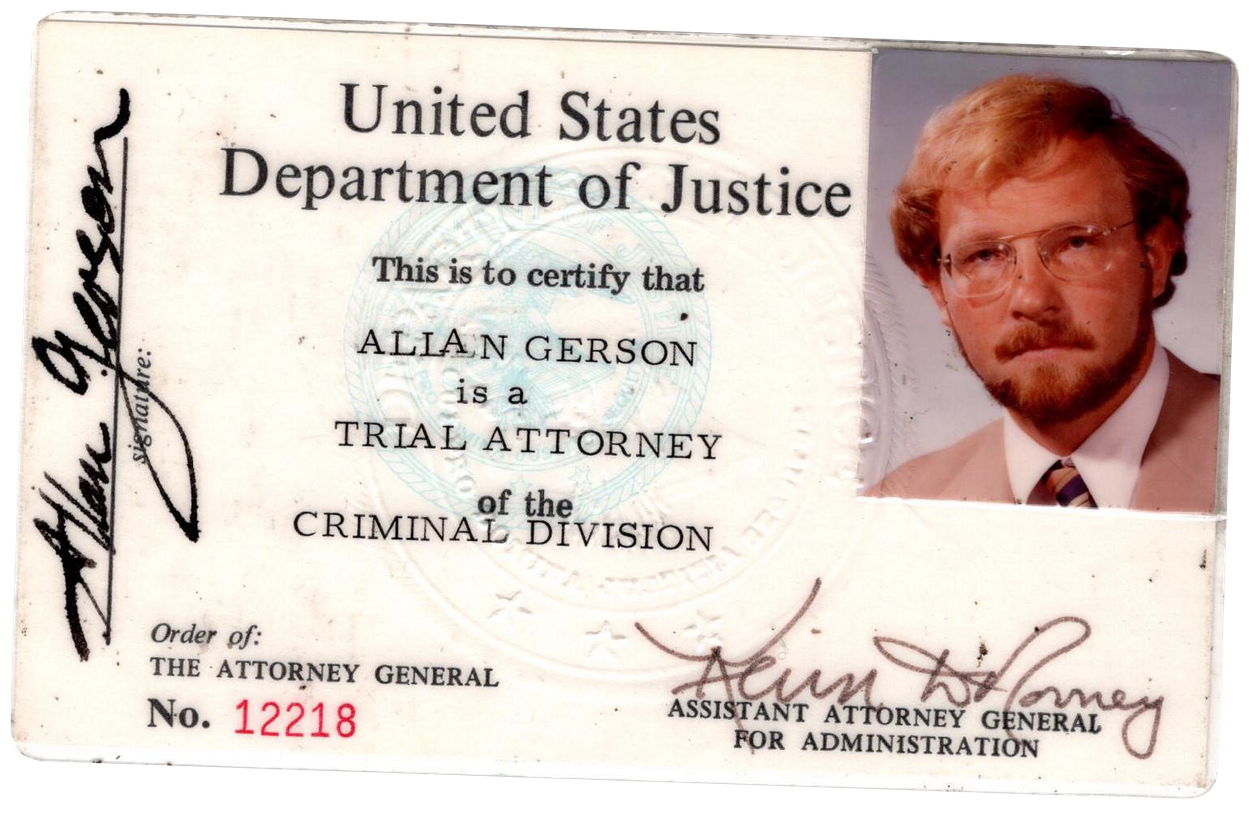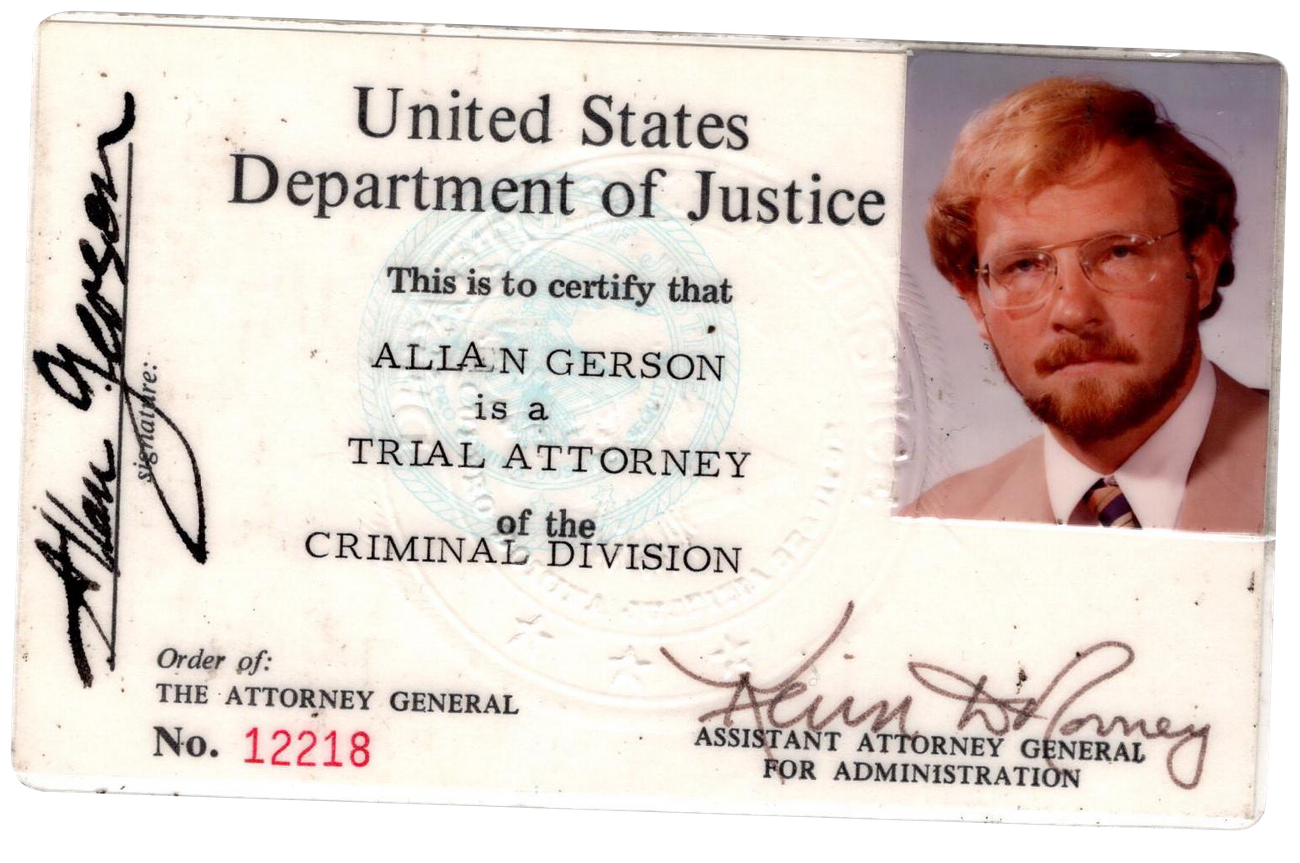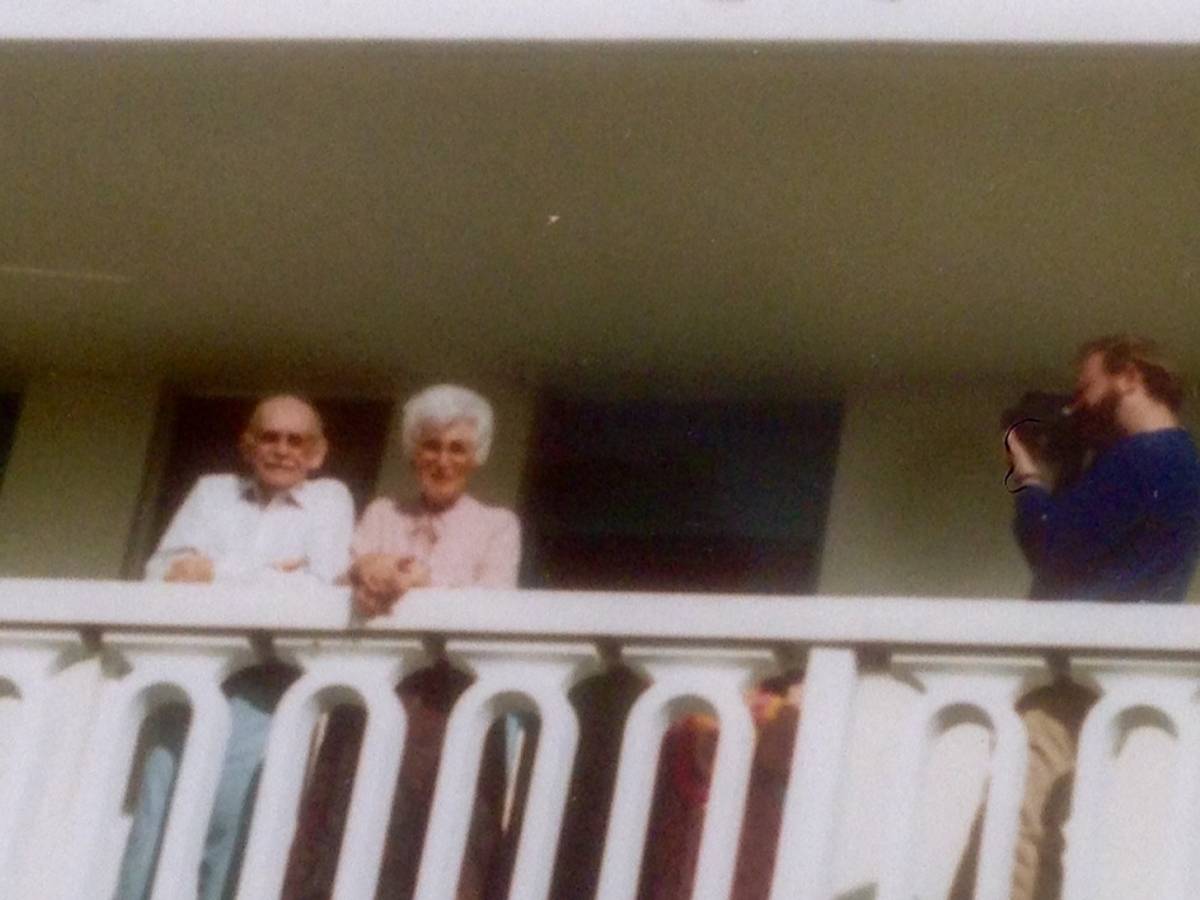‘The Nazis Are Already Dead’
Before he could embark on a job prosecuting Nazi collaborators, a prosecutor first had to convince his parents that it was a good idea




When federal prosecutor Allan Gerson took a job with the Department of Justice’s Office of Special Investigations, his mission was prosecuting aged Nazi collaborators. But as he described in his new, posthumously published memoir Lies That Matter, the decision to join OSI wasn’t a simple one; he had to explain it to his parents, who were Holocaust survivors.
En route to Miami, to the first real conversation with my parents since taking the OSI job, I tried out lines that would explain my decision and why I had held off telling them about it for more than two weeks. At 34, I was still seeking parental approval.
But this was no ordinary job, and it went to the core of their being, their suffering. So I both hoped and expected that they would be thrilled with my announcement, view the new position as tied to divine justice, even though they didn’t believe much in God. The reality, it occurred to me, was that they might believe my new venture could backfire into an “andere falsche Got,” another false God, as my father would often mutter under his breath when yet another hope was dashed by disappointment.
Though nearly three decades had passed since they reconstituted their lives in America, the past nevertheless gnawed mercilessly at them both. It could not be avenged. It could only be absorbed as a memory by clinging to it like a hapless swimmer to a raft. They believed that the Holocaust had not merely turned the murdered Jews of Zamość into victims, but that somehow, their death rested on a higher plane. They were martyrs, and martyrs cried out to be honored.
Yet despite my reservations, I believed my parents would approve of, if not embrace, my new position. Could anyone have a stronger desire to see Nazi collaborators brought to justice? Could anyone have a greater stake in forcing the enablers to give up their reinvented American lives, to lose their United States citizenship, and to face deportation? And if that meant being dispatched to the Soviet Union to face a quickie trial for treason with a firing squad in its wake, so be it. My parents could surely live with that. The martyred deserved no less.
I realized that it might not be so easy for them, that other considerations might come into play. My parents had refrained from telling me many of the specifics about how they survived the war or how they made it to America, the part of their lives placed in my imaginary “Better Not To Know” box. This reticence was not uncommon among Holocaust survivors. Some memories are better left undisturbed.
They had been living for the past six months at Point East, a retirement community in North Miami Beach. It was pleasant enough, a reprieve from the harsh winters in the north and the burden of running a dry cleaning and tailoring establishment in the Bronx, which they had done for the previous 20 years. They had carefully saved their pennies, and when they saw their opportunity to move south, they seized it and had already made the adjustment. In no time, my father had become president of a new Jewish cultural center at their retirement enclave.
As I entered their condo, a warm sea breeze flowed through the open windows. My mother’s hug was, as always, nearly overbearing. My father’s approach was quite the opposite: a hand shake rendered without making eye contact. As Ma served her apple cake, I turned to explaining my mission.
“It’s called OSI, the Office of Special Investigations, and it’s a new part of the U.S. Justice Department,” I said. “The mandate is to track down Nazi collaborators who are living in America and to deport them.” Then, beaming, I drew from my pocket my new badge and my Justice Department ID card, which included my headshot. But instead of visible pride, a curtain of dead silence descended. My mother’s face hardened as my father’s gaze sunk.
Perhaps they were waiting for some elaboration, so I began again. “What the badge signifies,” I said, “is that you’re looking at OSI’s first trial attorney.” But the only look I got from my mother, still beautiful after all these years, was one of consternation, as if I had just announced my intention to abandon the practice of law in favor of becoming a professional thug.
My father’s face remained blank, his eyes still averting my gaze as his fingers stayed busy nudging with his fork the last bit of pastry.
He looked up, breaking the icy silence. “My son, I don’t know if this is really good for you,” he said, peering into the distance through his thick farsighted lenses. “You were doing so well at your job.”
That was true, at least by all outward appearances. While at DOJ’s Civil Division, I had argued cases all over the country, most of them successfully. My salary was sufficient to keep Joan and Daniela, then a two-year-old charmer, warm and fed. But I desired something on a grander scale, something tied to promoting fundamental human rights, if not making a difference in matters of war and peace. At OSI I had the opportunity to make sure that the bad guys who were living the good life here in America wouldn’t win in the end. Didn’t he get that?
Besides, although I had resisted the idea that my family history should be a driving factor in my work at OSI, the fact is that once I became immersed in the work, reading the files and visualizing the accounts of the death camps, I recognized that I was indeed now in a position to in some small way avenge my parents’ suffering and my family’s deaths.
But this calculus didn’t seem to be getting across. My parents continued to seem uneasy, which only befuddled me more and more as we fell into an awkward silence.
I looked around the room. The balcony door was open, the sun bathing the living room in a soft glow. I had seen their Florida place once before, several months earlier, when I helped them settle in. Their condo had since become a hybrid of Miami tropical with Bronx stolid decor: a new white sofa and chairs squared off against the dark mahogany credenza and oversized cocktail table that they had brought from their residence up north. The marriage of styles captured the past and present of my parents’ lives in America.
I knew it wasn’t good asking my father directly why he wasn’t happy. He would always say when such questions were asked: “if man darf schoen fragen, ist schoen garnicts veg,” if one has to ask, it’s already worthless. But I nudged him on to reveal what it was about my new job that was bugging him.
“Because what you’re after was a long time ago. The Nazis are already dead.”
“Not all of them, Dad, and not their helpers.”
“And you’re the one who’s going to catch these people and deport them? As if this is your destiny?”
I explained to him that we were not going to be trying them for war crimes in the death camps and elsewhere, but that we were pursuing the collaborators on visa fraud. When they applied for U.S. visas, they swore that they had never assisted in persecution, but that’s what they did. So, their visas are invalid because they were based on lies. As a result, their U.S. citizenship can be revoked.
“Then,” I concluded, “we can then get rid of them.”
“You mean, deported?” he said
“Yes, precisely.”
That was hardly assuring. “Herzach si, mein son,” Listen here, my son, he said after pausing for a long moment, as if to measure his words. “So many people lied back then. It wasn’t so easy to get into America after the war, when the quota for Jews lightened a bit and then tightened. You had to have a relative as a sponsor. And a job waiting for you in an occupation considered in demand. Do you remember our friend David?”
“Of course, in New York.”

“Yes, David, who had tuberculosis, swore when the Americans interviewed him that he was healthier than a cow. And Joseph, who lives next door to us now.” Dad pointed out the window to the neighboring condo. “Joseph claimed he was a carpenter, and the fact is, he doesn’t know a hammer from a sickle.”
He paused, and then said slowly, quietly, “And don’t forget our own not-so-straight path to becoming citizens here, the risks we took, what we endured.”
I realize what my father was getting at; that we too might be in jeopardy. Or if not us directly, perhaps my Uncle Henik, for he had survived Auschwitz. But how?
“I’m trying to understand. What are you getting at, Dad?” I said as I took up my teacup to steady myself against a growing agitation.
I fell back on the nuances of the law. “OSI won’t be concerned about white lies Jewish survivors made,” I said, thinking I had gotten to the source of his concerns.
“What is ‘a white lie?’”
“It’s one that isn’t a crucial misrepresentation; it’s not a lie like claiming you weren’t a guard at a death camp or saying you didn’t round up the Jews to send them to their death when you did. The ones that did that, who voluntarily chose to help the Nazis, they’re the ones, the only ones, we are after.”
But I had managed only a dent in his universe of concern. “That’s still a wide net that could catch many Jews.”
“Please,” I said. “OSI’s only purpose is to go after Nazi collaborators living in America. It’s about those who had a choice, and they chose to help Hitler.”
My mother sat back on the couch. Crossing her legs, she placed a napkin over her knees. Her own plate of strudel remained untouched. Her silence hung heavily over every word of my give-and-take with Dad.
“So technically, if I understand correctly, although I am of course not a lawyer like you,” Dad said, determined to make his point, “OSI will be taking away their citizenship not because of what they did, the atrocities they committed, but because they lied about it. It’s a little like getting Al Capone for tax evasion, no?”
“No, Dad. Putting Al Capone on trial for tax evasion didn’t shed any further light on organized crime. It was simply a way of putting him away in prison.”
“So how is OSI different?” he asked
I placed my cup of tea on the table. “Don’t you see? It’s the opposite. We put these collaborators on trial for immigration fraud, and during the course of that trial we will shed light on the role they, and collaboration generally, played in perpetration of the Holocaust.”
“So, it will be about the Holocaust?” my father asked.
“Yes, of course!” I replied, perhaps too readily. I sought out my father’s eyes. “It’ll be about the Holocaust itself. How it was perpetrated. Who the willing helpers were, how the collaborators made it possible.”
“Oy Gottenu, Oh, my God, have mercy,” Ma suddenly uttered, breaking her silence with a deep sigh.
“So now why all of sudden this new push?” she asked. “All these years and the government never cared about these people before. So why is the U.S. government now in such a big hurry?”
She sat upright, staring at me as if I were on trial. “Haven’t you moved around enough? You have degrees galore. You don’t want to lay down roots? You have to settle down.”
I folded my arms into a self-protective barrier. “Look, Congress has had a number of reports of Nazi collaborators living undisturbed in America.
“So?” Ma sighed again. I could see her thinking that I was walking into this blindly, chasing ghosts, leaving prudence by the wayside. “You think we don’t know that?”
She held her arms out from her sides, as if closing in on her summation. “But what about your future? Where is your future in this?”
I stood my ground. “Look. I want to do this because it’s important. I thought you—you and Dad, more than anyone—would understand that.”
My mother burrowed her fork into a piece of strudel. “If it’s so important, let others do it! You are not made for this kind of work.” That hurt. Did she think I was too soft?
Dad joined in, his voice calm but resolute. “Maybe your mother is right. Maybe you should let others do it.”
What could be going through their minds? It was one thing to repeatedly proclaim “never forgive, never forget”; quite another to have their son go into the maelstrom, confront these tormentors, the embodiment of the beast that had engulfed their lives in such untold misery. What parent wouldn’t want to spare their child from re-experiencing their torment, and at the price of passing on an otherwise sensible career? Then this thought occurred to me: perhaps there was unspoken matter that they didn’t want to touch upon.
I pushed those thoughts aside. Our conversation had reached an impasse. There was nothing I could do to relieve their anxiety.
“Dad, I’ve made my decision,” I said, as I stood up. “I respect everything you and Ma have said, I really do, but I have to follow my instincts. Please don’t worry. I assure you that it will all work out for the best.”
“Allevai, It should only be so,” Ma said. She hugged me, and Dad patted me on the back as if to say, I am proud of you, regardless of what you do.
My whirlwind visit had spiraled in ways I hadn’t anticipated. As I headed to the rental car for the trip back to the airport, I gave them one last look. They stood on the balcony overhead, waving a cheerless goodbye. I waved back.
Excerpted from Lies That Matter by Allan Gerson (New Academia Publishing/VELLUM 2021).
Allan Gerson was an international lawyer, widely recognized as the first American attorney to successfully sue a foreign government for complicity in acts of terrorism. He wrote The Price of Terror: How the Families of Pan Am 103 Brought Libya to Justice (with Jerry Adler), and The Kirkpatrick Mission: Diplomacy Without Apology, documenting the years as senior counsel to the U.S. ambassador to the United Nations. He also was a trial attorney at the U.S. Department of Justice, a senior fellow at the American Enterprise Institute and Council on Foreign Relations, and a distinguished professor of international law at George Mason University. He died on December 1, 2019.